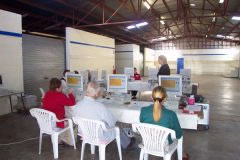
|
|
Skill.net Internet Training on the Road in Queensland, Australia by Anna Raunik
The skills.net Roadshow is a mobile Internet training solution developed to meet the needs of the Queensland community in Australia. In operation since 2001 the Roadshow has travelled over 14,920 kilometres (9,200 miles), visited over 30 communities and trained over 3,000 people in Internet use.
Queensland covers an area more than 1.7 million square kilometres; it is more than a quarter of Australia. It is more than 7 times the size of the United Kingdom, and 2.4 times the size of Texas. It is comparatively uncrowded with a population of approximately 3.5 million or 2 people per square kilometre. The challenge is to deliver equitable services in this large geographic region.
The State Library of Queensland's Future Directions Policy states that the State Library will provide "increased community education and training enabling knowledge reation and lifelong learning." The skills.net Roadshow is one of a number of initiatives that delivers on this strategy. The Roadshow is a successful example of a corporate sponsorship achieving community benefits. BHP Billiton has provided US$200,000 for two years. The other sponsors are Telstra Country Wide (telecommunications provider) and Ipex Information Technology Group (hardware supplier).
The objectives of the training project are to deliver relevant training in local venues in remote and rural Queensland. To deliver training in local venues a mobile training laboratory is required. A transport van travels to each community and a temporary training facility is established by State Library staff in a local venue. The venue is selected by the local public librarian and varies from meeting rooms in the public library to boardrooms to local community halls. The van carries state of the art technology: a wireless network, flat screen monitors and satellite connectivity. A network of 10 computers for hands on training is set up with a presentation projector and a laser printer. The equipment is packed in specially designed crates for transportation. Fast access to the Internet in regional Queensland is limited and sporadic. There is no guarantee that venues will have access to the high-speed lines required to deliver training. A mobile satellite dish provides the ideal solution. The 85-cm dish is set up outside each venue and trainers locate the satellite using a spectrum analyser. A local phone line is used to provide the up link to the Internet. A mobile phone has been successfully used as a back-up option. State Library staff provide the training sessions which run for two hours and are delivered at times that suit the community. The most popular courses are Introduction to the Internet, Advanced searching skills, and E-mail use. Other courses offered include specialist subjects such as health, law and job seeking. Targeted courses are offered to youth (homework help), seniors, parents, job seekers and seniors. A web site promotes the project and provides details of the schedule, course notes and handouts, photos of training sessions, feedback from participants and milestones. The schedule includes larger urban towns (over 70,000) to small outback communities of 300 people. Communities vary from rural, agricultural, mining centres to seaside towns. Monto May 20-22, 2002
The impact of the training is best evaluated by the feedback from the participants who travel long distances to attend multiple sessions:
Trainers also provide useful accounts of the impact of the training:
Local public librarians report increased membership and use after a Roadshow visit. One librarian from Emu Park commented, "There's a definite increase in Internet usage and I have heard of a few people actually buying computers." The Roadshow has provided a valuable opportunity for the State Library of Queensland to deliver on literacy and community education strategies. One participant wrote in their evaluation: "This course provided me with the basic information that my 11-year-old son usually guides me through. With these skills I feel confident to have a go unsupervised by myself." Anna Raunik is Executive Manager of Digital Services for the State Library of Queensland, Australia.
Comments
Post a comment
|
||||